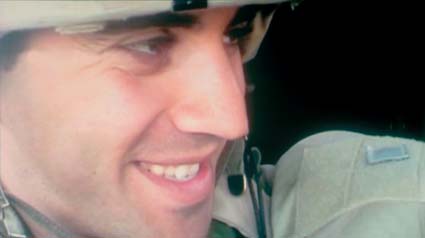 |
 |
| current issue |  |
past issues |  |
send a letter/news |  |
address update |  |
advertise |  |
about us |  |
alumni home |
Features
Witness to WarPage 3 of 3

|
Zack Bazzi began life in the midst of a civil war. When fighting erupted in their neighborhood in Lebanon, his mother used to pack her young children into the bathtub and tell them to keep their heads down. He went to sleep to the sound of gunfire. When Bazzi was eight, his family fled to a new life in Watertown, Mass., where Bazzi attended school and no longer lived in fear.
Today, Bazzi's mother throws up her hands when she talks about her son. How can it be that she worked so hard to bring her child to safety and now he volunteers to go to one of the most dangerous places on earth? "For one year, all I can think of is Iraq," she laments in the movie. "I go to sleep...Iraq. I wake up....Iraq." While his mother worries, Bazzi shrugs. "I like to be in the middle of things," he says, with characteristic understatement. "My childhood made me stronger." The only thing he's afraid of is being a bad leader. He says he never contemplates the possibility of his own death. The way he looks at it, the war is a job--a job he loves. "I feel 10 times more alive on deployment," says Bazzi. "It's like life on steroids."

|
Bazzi often sounds like a poster child for the military when he talks about his life. "All the good things about me, my strongest traits, I attribute to service in the Army," he says. "People say 'Thank you' for my service. But I feel like I've gotten so much." Among other things, Bazzi's gotten an education; the military is paying for it and he's grateful. "I'm a first-generation immigrant and it's rare that someone in my position would have a chance to go to college."
In Fall 2002, with four years in the Army behind him, Bazzi settled into classroom life with students just out of high school. He chuckles at the contrast: "UNH is a bubble," he says. "Life here is designed to be safe and comfortable and happy. Unfortunately, the world is none of these three."Bazzi is the first to admit, though, that college has changed him. It has, he thinks, made him a better soldier. "You need the intellectual as well as the physical," he says. "I like my views to be challenged. If your ideas don't hold up, you get rid of them." Not surprisingly, the film casts Bazzi as the thinking soldier, the warrior who is acutely aware that he is defending his own right to disagree with his government.
Bazzi explains his views with an analogy he picked up in an environmental conservation class. "If you have a field planted with a single crop and a pest attacks, it'll wipe everything out. But if you have a variety of crops, everything is stronger--they can't be wiped out with one pest. What makes our country great is the great variety of opinions that exist within it." Bazzi pauses, then quotes himself, repeating verbatim the closing lines of the film. "I love being a soldier," he says. "The only bad thing about the Army is you can't pick your war."

|
On a visit to campus last summer, Bazzi heads for a reading room in Dimond Library. Late afternoon sun slants through the high-ceilinged room, cutting patterns across the tables. The total silence seems about as far from a firefight in the desert as one could possibly imagine. Bazzi sits down, takes it all in. "I practically lived here," he says, recalling the semester he spent at UNH just before getting called to Iraq. This fall he plans to finish his degree in international affairs and psychology. When he graduates, he wants to do something with his life that will have an impact and involves travel. On the other hand, if he gets The Call--and he hopes he will--he will head straight back to Iraq. No question. He's done it before. He'll do it again.~
Easy to print version
blog comments powered by Disqus
